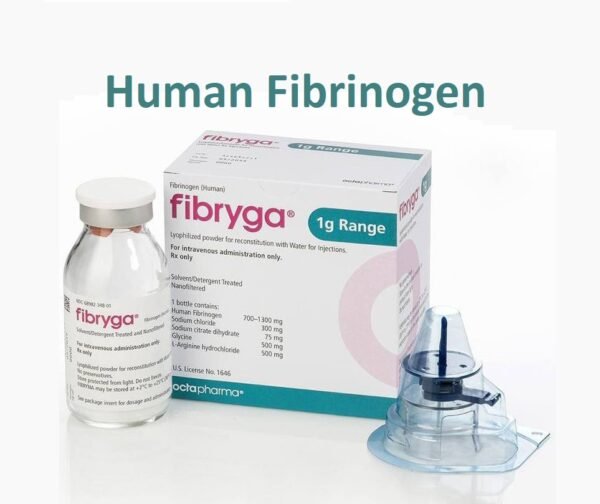Fibrinogen (Fibryga) is also called Coagulation Factor 1. It is a protein that is required for normal hemostasis in patients who are actively bleeding.
Fibrinogen (Fibryga) Uses:
-
Congenital fibrinogen deficiency:
- It is inidcated for the treatment of active bleeding in patients with congenital fibrinogen deficiency (including afibrinogenemia and hypofibrinogenemia).
Fibrinogen (Fibryga) Dose in adults
Fibrinogen (Fibryga) Dose in the treatment of Congenital fibrinogen deficiency:
Note: The following targets must be the goals of therapy in patients who are actively bleeding:
- Minor bleeding: Target fibrinogen levels of 100 mg/dl
- Major bleeding: Target fibrinogen levels of 150 mg/dL.
-
When baseline fibrinogen level is known:
- Fibryga:
- Dose (mg/kg) = [Target level (mg/dL) - measured level (mg/dL)] divided by 1.8 (mg/dL per mg/kg body weight)
- RiaSTAP:
- Dose (mg/kg) = [Target level (mg/dL) - measured level (mg/dL)] divided by 1.7 (mg/dL per mg/kg body weight)
- Fibryga:
- When baseline fibrinogen level is not known, administer at a dose of 70 mg/kg.
Fibrinogen (Fibryga) Dose in Childrens
Note: Based on the severity of the bleeding, test results, the patient's clinical condition, and the goal fibrinogen concentration, the dosage must be customised for each patient.
Fibrinogen (Fibryga) Dose in the treatment of acute bleeding due to Congenital fibrinogen deficiency:
Note: The following goal should be maintained in actively bleeding patients:
- In patients with minor bleeding: Target fibrinogen levels should be kept at 100 mg/dl.
- In patients with major bleeding: Maintaining a target fibrinogen concentration of 150 mg/dL is important.
-
Initial dose:
- When the baseline fibrinogen concentration is known:
- RiaSTAP dose in infants and children:
- Dose (mg/kg) = [Target fibrinogen concentration (mg/dL) - measured fibrinogen concentration (mg/dL)] divided by 1.7 (mg/dL per mg/kg body weight)
- Fibryga dose in adolescents:
- Dose (mg/kg) = [Target fibrinogen concentration (mg/dL) - measured fibrinogen concentration (mg/dL)] divided by 1.8 (mg/dL per mg/kg body weight)
- When the baseline level is not known: Fibryga, RiaSTAP:
- Infants, Children, and Adolescents: IV: 70 mg/kg
- RiaSTAP dose in infants and children:
- Based on the patient's condition and the results of the laboratory tests, the dose must be modified.
- If the fibrinogen concentration falls below 80 mg/dl for patients with light bleeding or 130 mg/dl for patients with heavy bleeding, more doses may be given until the bleeding stops.
- When the baseline fibrinogen concentration is known:
Fibrinogen (Fibryga) Pregnancy Risk Category: C
- Hypofibrinogenemia or congenital afibrinogenemia can be linked to an increased risk for pregnancy loss, bleeding, and thrombosis.
- Although maternal fibrinogen levels increase during pregnancy, they are not sufficient to protect the baby or mother from potential complications.
- Pregnant women may need to be treated with prophylactic medication. The dose requirement may rise as the pregnancy progresses.
- Prophylactic replacement may be necessary for patients who are pregnant.
- Plasma derived fibrinogen concentrate can be used to treat severe deficiency.
Use during breastfeeding:
- Manufacturer suggests weighing the risks of drug exposure in infants and mothers.
Dose in Kidney Disease:
In the manufacturer's labeling, adjustment in the dose has not been recommended.
Dose in Liver disease:
In the manufacturer's labeling, adjustment in the dose has not been recommended.
Side Effects of Fibrinogen (Fibryga):
-
Central nervous system:
- Headache
-
Dermatologic:
- Erythema
- Pruritus
-
Gastrointestinal:
- Vomiting
-
Neuromuscular & skeletal:
- Weakness
-
Miscellaneous:
- Fever
Contraindications to Fibrinogen (Fibryga):
- Anaphylactic reactions that cause severe, immediate hypersensitivity, including anaphylactic reactions due to fibrinogen products, human plasma products, or any component of formulation.
Warnings and precautions
-
Hypersensitivity
- Allergy reactions such as urticaria and chest tightness, wheezing or hypotension, anaphylactic reaction, shortness of breath, hypotension, hypotension, and hypotension may be present.
- If the patient experiences signs or symptoms of hypersensitivity reaction, treatment must be stopped immediately.
-
Thrombotic events
- Patients with congenital fibrinogen deficiencies may experience thrombosis, even if they have fibrinogen replacement.
- The risk of thromboembolic complications may rise after receiving fibrinogen concentrate replacement.
- It is important to monitor patients for signs and symptoms of thrombosis.
- It is important to weigh the risks and benefits of replacing fibrinogen.
Monitoring parameters:
- Fibrinogen level
- Signs and symptoms of thrombosis and allergic reactions.
How to administer Fibrinogen (Fibryga)?
- Only an intravenous infusion at a flow rate not to exceed 5 mL/minute should be used to give it.
- It should not be taken concurrently with other intravenous products and should be delivered at room temperature.
- After reconstitution, the solution should be administered within 8 hours (RiaSTAP) or within four hours (Fibryga).
Mechanism of action of Fibrinogen (Fibryga):
- Fibrinogen can also be called coagulation factor 1.
- Fibrinogen is an essential component of normal huma plasma.
- It is necessary for the formation of clots at the site where there is bleeding.
- It is indicated to be used in the treatment of fibrinogen-deficient patients, as well as patients with congenital fibrinogen deficiencies or dysfibrinogenemia.
Half-life eliminationIt is very similar to biological fibrinogen
- Biological fibrinogen: 100 Hours
- Fibryga: Patients aged 12 to 53 years: 75.9 +-23.8 (40 to 135 hours).
- RiaSTAP
- Patients under 16 years old: 69.9 + 8.5 hours
- Patients aged 16 or older: 82.5 + 20 hours
Excretion:
- RiaSTAP is less effective in children under 16 than adults.
International Brand Names of Fibrinogen:
- Fibryga
- RiaSTAP
- Haemocomplettan
- Haemocomplettan P
- RiaSTAP
- Riastap
Fibrinogen Brand Names in Pakistan:
No Brands Available in Pakistan.







